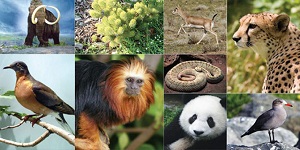
Biodiversity 2020

Theme: Saving and Restoration of Species
Webinar on Biodiversity and Ecological Restoration is going to be held on September 29, 2020 at Singapore City, Singapore. This biodiversity conference will provide a robust and dynamic platform and also aims to promote the restoration of a spectrum of “saving and restoration of species”. This conference invites the global community of environmental professionals that includes researchers, ecologists, students, environmentalists, coversationists, botanists, zoologists, entomologists, and oceanographers who are actively engaged in this field.
So we invite you to join this global environmental event, in the beautiful city of Phuket, to discuss the economic prosperity and environmental sustainability.
Below are the sessions to be discussed:
1. Biodiversity & Ecology: Biodiversity helps in maintaining climate change and also prevents natural calamities. Biodiversity helps to regulate the nutrient cycle, water (e.g. floods) and mitigates impacts of climate change. In simple terms, it is the variability and variety of living organisms together with ecological facilities in which they exist. Let us try to understand biodiversity as a whole and biodiversity conservation which has become a major issue in this developing age. This conference will provide a platform to discuss on biodiversity and ecology restoration for the beneficial of mankind.
Biodiversity Conference | Ecology Conference | Environmental Science Conference | Ecology Workshop | Global Biodiversity Conference | Global Ecology Conference | Ecology Congress | Biodiversity Meeting | Biodiversity Events | Biodiversity2020 | Ecology 2020 | European Biodiversity Conference | European Ecology Conference
2. Plants and Animal Biodiversity: Animals have adapted to survive and thrive in their environmental riches. Is one of the most fascinating aspects of biology? Farm animal biodiversity is so important for maintaining genetically diverse and healthy livestock. However, this diversity is being threatened by some industrial farming operations that depend on a small number of farm animal breeds that can thrive in an intensive livestock environment. Because of this, farm animal breeds that don't thrive in factory farming operations are becoming rarer. Plants species consists of familiar organisms such as trees, herbs, bushes, grasses, ferns and mosses. With the help of photosynthesis they convert water and carbon dioxide into the oxygen we breathe and the sugars that provide the primary fuel for life. Plants holds the major role to evolution as a whole in that they produced the oxygen that made life on earth possible — not only by "breathing" it into the atmosphere and transforming it, but also by crushing rocks with their roots, which created soils and released nutrients on a large scale.
Plants Biodiversity|Animal Biodiversity |Ecology Workshop |Environmental Science Conference |Ecology Conference |Global Biodiversity Conference | Global Ecology Conference |Ecology Congress |Biodiversity Meeting |Biodiversity Conference |Biodiversity 2020| Ecology 2020 |European Biodiversity Conference | European Ecology Conference|Biodiversity Events
3. Ecological Behaviour: Shortage of landfill sites, pollution, the depletion of the ozone layer, and the greenhouse effect challenge human existence. Some adaptations are behavioural and sometimes behavior drives the evolution of new adaptations by creating new selective environments. If an organism has a trait that provides an adaptive significance in its environment, then natural selection favours it. Adaptive significance refers to the expression of a trait that affects fitness, measured by an individual's reproductive success.
Ecological Behaviour|Biodiversity Conference | Ecology Conference | Environmental Science Conference | Ecology Workshop | Global Biodiversity Conference | Global Ecology Conference | Ecology Congress | Biodiversity Events |Biodiversity Meeting | Biodiversity 2020 | Ecology 2020 | European Biodiversity Conference | European Ecology Conference
4.Coastal & Marine Biodiversity: We people need air to breathe, water to drink, food to eat, new medicines, a climate we can live in, beauty, inspiration and recreation. As we know that living oceans absorb carbon dioxide from the atmosphere and reduce climate change impacts. The diversity and productivity of the world's oceans is a vital interest for human kind marine species provide important ecosystem services such as the provision of food, medicines, and livelihoods. They also support tourism, recreational and many other activities around the world. Unfortunately, the resources of the sea have been over-harvested by humans, threatening marine biodiversity and we should think on it.
Coastal Biodiversity|Marine Biodiversity|Biodiversity Conference | Ecology Conference | Environmental Science Conference | Ecology Workshop | Global Biodiversity Conference | Global Ecology Conference | Ecology Congress | Biodiversity Meeting | Biodiversity Events | Biodiversity 2020 | Ecology 2020 | European Ecology Conference | European Biodiversity Conference
5. Genetic Diversity: All types of life, regardless of whether microorganism, plants, people contain genes. It is nothing but the sum of genetic information contained in the individual plants, animals and microorganism. Important conservation consequence of this is even an endangered species is saved from extinction.
Genetic Diversity|Biodiversity Conference | Ecology Conference | Environmental Science Conference | Ecology Workshop | Global Biodiversity Conference | Global Ecology Conference | Ecology Congress | Biodiversity Meeting | Biodiversity Events | Biodiversity 2020 | Ecology 2020 | European Biodiversity Conference | European Ecology Conference
6. Green Economy: It aims on economy that aims at reducing environmental risks and ecological scarcity and its main focus is for sustainable development without degrading the environment.
Green Economy|Biodiversity Conference | Ecology Conference | Environmental Science Conference | Global Biodiversity Conference | Ecology Workshop | Global Ecology Conference | Ecology Congress | Biodiversity Meeting | Biodiversity Events | Biodiversity 2020 | Ecology 2020 | European Biodiversity Conference | European Ecology Conference
7. Forestry: Forestry is nothing but the science and craft of creating, using, managing, repairing woodlands, and associated resources for human and environmental benefits. If we talk about economic segment then forestry plays an important role in various industrial countries. For example, if we talk about Germany, then forests cover nearly a third of the land area, wood is the most important renewable resource, and forestry supports more than a million jobs and nearly about €181 billion of value to the German economy each year.
Forestry|Biodiversity Conference | Ecology Conference | Environmental Science Conference | Ecology Workshop | Global Biodiversity Conference | Global Ecology Conference | Biodiversity Meeting| Ecology Congress | Biodiversity Events | Biodiversity 2020 | Ecology 2020 | European Biodiversity Conference | European Ecology Conference
8. Environmental Toxicology: Environmental Toxicology is about the study of the effect of the man-made and natural chemicals on health and the environment. It includes the study of the effect of chemical on organism.
Environmental Toxicology|Ecology Workshop | Ecology Conference | Environmental Science Conference |Biodiversity Conference | Global Biodiversity Conference | Global Ecology Conference | Ecology Congress | Biodiversity Meeting | Biodiversity Events | Biodiversity 2020 | Ecology 2020 | European Biodiversity Conference | European Ecology Conference
9. Entomology: It is the study of insects and their relationship to human, environment and other organism. And entomologists make great contributions to such diverse field such as agriculture, chemistry, biology etc.
Entomology|Biodiversity Conference | Ecology Conference | Environmental Science Conference | Ecology Workshop | Global Biodiversity Conference | Global Ecology Conference | Ecology Congress | Biodiversity Meeting | Biodiversity Events | Biodiversity 2020 | Ecology 2020 | European Biodiversity Conference | European Ecology Conference
10. Captive Breeding: It is a process of maintaining plants or animals, in a controlled environment, Like zoos, botanical garden. It also used for saving species from extinction.
Captive Breeding|Biodiversity Conference | Ecology Conference | Environmental Science Conference | Ecology Workshop | Global Biodiversity Conference | Global Ecology Conference | Ecology Congress | Biodiversity Meeting | Biodiversity Events | Biodiversity 2020 | Ecology 2020 | European Biodiversity Conference | European Ecology Conference
11. Biodiversity Management: Biodiversity management is nothing but it’s a type of management which can be done by managing the sustainable forest and harvesting Trees, and the ecological restoration.
Biodiversity Management|Biodiversity Conference | Ecology Conference | Environmental Science Conference | Ecology Workshop | Global Biodiversity Conference | Global Ecology Conference | Ecology Congress | Biodiversity Meeting | Biodiversity Events | Biodiversity 2020 | Ecology 2020 | European Biodiversity Conference | European Ecology Conference
Market Analysis :
Biodiversity is the shortened form of two words “biological and diversity”. Biodiversity conference will provide a robust and dynamic platform and also aims to share and discuss on, how different types of species evolved in our ecology. It will also aims to promote the restoration of a spectrum of “Saving and restoration of species”.
Scope of conference: The scope of such a conference is to develop national strategies for the conservation and sustainable use of biological diversity. Scope of biodiversity also includes ecology, evolution, marine science, animal science, plant science, landscape, environmental science, geology, forestry, sustainable energy, medicinal field etc.
Business value: Conservation values are beginning to inform consumer and investor decisions. Eco-labeling schemes are being developed that advertise or certify that products were produced in ways consistent with biodiversity conservation. The global trade in certified organic agriculture was worth $21 billion worldwide in 2000. 10 International organic standards are expanding to landscape-scale biodiversity impacts. The rainforest alliance and the sustainable agriculture network certify coffee, bananas, oranges, and other products grown in and around high biodiversity-value areas. The sustainable agriculture initiative is a coalition of multinational commercial food producers (Nestle, Dannon, Unilever, and others) who are seeking to ensure that all of the products they purchase along the supply chain come from producers who are protecting biodiversity. In 2002, more than 100 million hectares of forest were certified (a fourfold increase over 1996), although only 8 percent of the total certified area is in developing countries, and most of that is in temperate forests. If we look to the current scenario then Available information suggests that biodiversity protection services are presently the largest market for ecosystem services. A team from McKinsey & Company, the World Resources Institute, and The Nature Conservancy estimated the annual international finance for the conservation market (conservation defined as protecting land from development) at $2 billion, with the forest component a large share of that.11 Buyers are predominantly development banks and foundations in the United States and Europe.
List of Global Universities:
University of Southern California, USA
University of Florida, USA
Yale University, USA
University of Kansas, USA
Pace University, USA
The University of Edinburgh, UK
Oxford Brookes University, UK
Cardiff University, UK
University of Regina, Canada
University of Toronto, Canada
Brock University, Canada
Seoul national university, South Korea
Kyoto University, Japan
University of Malaya, Malaysia
University of Jena, Germany
Funding opportunities: The most important single source of funding for biodiversity-related activities is the financial mechanism of the convention, the Global Environment Facility (GEF). The GEF supports implementation of the GTI in several ways.
Forecast for next five years: As the theme of our Conference is “Saving and restoration of species”. By repairing ecosystems damaged through human activities, ecological restoration plays an important role in biodiversity conservation efforts. Furthermore, restoration promotes functional ecosystems and the ecosystem services they provide to humans. Restoration projects span virtually every type of ecosystem on Earth, employ a variety of increasingly sophisticated approaches and range in scope from small, locally driven endeavors to global-scale initiatives like the Bonn Challenge (to restore hundreds of millions of hectares of forest).
Refrences:
https://esanalysis.colmex.mx/Sorted%20Papers/2004/2004%20USA%20-3F%20Interd%201.pdf
https://www.cbd.int/doc/meetings/sbstta/sbstta-21/official/sbstta-21-02-en.pdf
Webinar on Biodiversity and Ecology Restoration invites the global community of environmental professionals that includes researchers, ecologists, students, environmentalists, coversationists, botanists, zoologists, entomologists, and oceanographers who are actively engaged in this field. The size and diversity of our advertising options, including banners, sponsored emails, article alerts or newsletters, provide clients with the very best customized marketing opportunities in science.
The advertising platform we provide you is the best chance of showcasing your products/services, and branding your company. If you are looking for a global exposure for your products and services, this is the right place for you. With over 5 million readers worldwide and nearly 3 million hits a month on our website, we have engaged audience of students, research scholars, scientists, doctors, professors, pharmacists and professionals from companies across the domains.
If you sell research materials, products, chemicals, instruments, or you are looking to recruit that next investigator, here is your opportunity to advertise in the website that can connect you to leading experts and science specialists across the Globe.
Advertisement banner must be provided in high resolution jpg or jpeg format by the advertising company and must not have copyright infringement. We can also support your events and conferences by providing you with high quality reprints of published articles that can add value to your event.
For any queries regarding advertising opportunities, please contact:
Awards
Meetings International has taken an initiative to felicitate attendees with awards to recognise, celebrate and encourage achievement in its various conferences and events. These awards have different committees, nominating procedures and submission deadlines. We salute and acknowledge attainment within an industry that is continuously evolving and re-drawing the boundaries of best practice. These awards represent the pinnacle of professional achievement for event professionals. They recognize Best Eminent Presentation Award, Outstanding Oral Presentation Award, Best Organising Committee Member Award, Outstanding Future Scientist Presentation Award & Best Poster Award. We invite all enthusiastic researchers from all around the world join us for the Biodiversity 2020 conference scheduled in Phuket, Thailand on February 17-18, 2020.
-
Best Eminent Presentation Award: Biodiversity 2020 will honours the Keynote Speakers who have made significant contributions to the field of information systems but also makes a difference by his presence during the conference. Recipients of the award are considered to have advanced the field through research or service.

-
Outstanding Oral Presentation Award: There will be a number of technical sessions in the conference under different themes. These awards are provided to the presentations that have been selected to be the best in the particular session. Biodiversity 2020 perceives the individuals who have made significant and imaginative walks in Environmental science. This award will be provided for the most outstanding presentation of the entire conference.

-
Best Organizing Committee Member Award: Biodiversity 2020 will honour the individual who has demonstrated exemplary support and guidance throughout the conference.

-
Outstanding Future Researcher Presentation Award: The Future Researcher Presentation Award will be given to the most outstanding presentation presented by a participant who has registered under the student category. Undergraduates, Master students, and Ph.D. students will be considered under this category. This award recognizes individuals in the early stages of their careers who have already made outstanding research, teaching, and/or service contributions to the field of information systems.

-
Best Poster Award: There will be a poster session at the Biodiversity 2020 and this award is dedicated to the poster presenters in the conference. The best poster presentation will be selected among all the researchers in the session. Recipients of the award are considered to be the Best Poster Presenter of the conference.

The awards given for our Biodiversity conferences recognise the wide range of responsibilities and dedication of Environmentalprofessionals who promote the highest standards of care across the whole health service. Biodiversity 2020 events make a huge contribution to maintaining and protecting the health and well-being of people across the globe.
Criteria:
- All presented abstracts will automatically be considered for the Award.
- All the presentation will be evaluated in the conference venue
- All the awards will be selected by the judges of the award category
- The winners will be formally announced during the closing ceremony.
- The winners of the Poster Award will receive award certificate.
- The awards will be assessed as far as plan and format, intelligence, argumentation and approach, familiarity with past work, engaging quality, message and primary concerns, parity of content visuals, and by and large impression.
Guidelines:
- All submissions must be in English.
- The topic must fit into scientific sessions of the conference
- Each individual participant is allowed to submit maximum 2 papers
- Abstract must be submitted online as per the given abstract template
- Abstracts must be written in Times New Roman and font size will be 12
- Abstract must contain title, name, affiliation, country, speakers biography, recent photograph, image and reference
- Each poster should be approximately 1x1 M long. The title, contents and the author’s information should be clearly visible from a distance of 1-2 feet.
Meetings International is announcing Young Scientist Awards through 2nd International Conference on Biodiversity and Ecology Restoration (Biodiversity 2020) which is scheduled at Phuket, Thailand during February 19-20, 2020. This Biodiversity conference focuses on “Saving and restoration of speciesâ€.
Biodiversity 2020 and upcoming conferences will recognise participants who have significantly added value to the scientific community of environmental science and provide them outstanding Young Scientist Awards. The Young Scientist Award will provide a strong professional development opportunity for young researches by meeting experts to exchange and share their experiences at our international conferences.
Biodiversity 2020 focuses mainly on New aspects in Biodiversity & Ecology Restoration, Green Economy, Captive Breeding, Environmental Toxicology and Environmental Toxicology. Biodiversity conference operating committee is providing a platform for all the budding young researchers, young investigators, post-graduate/Master students, PhD. students and trainees to showcase their research and innovation.
Eligibility:
Young Scientists, faculty members, post-doctoral fellows, PhD scholars and bright Final Year MSc and M.Phil. candidates. Persons from Scientific Industry can also participate.
Benefits: The Young Scientist Feature is a platform to promote young researchers in their respective area by giving them a chance to present their achievements and future perspectives.
- Acknowledgement as YRF Awardee
- Promotion on the conference website, Young Researcher Awards and certificates
- Link on the conference website
- Recognition on Meetings Int. Award Page
- Chances to coordinate with partners around the world
- Research work can be published in the relevant journal without any publication fee
Criteria:
- All presented abstracts will automatically be considered for the Award.
- All the presentation will be evaluated in the conference venue
- All the awards will be selected by the judges of the award category
- The winners of the Young Scientist Award will receive award certificate.
- The awards will be assessed as far as plan and format, intelligence, argumentation and  approach, familiarity with past work, engaging quality, message and primary concerns, parity of content visuals, and by and large impression.
Guidelines:
- All submissions must be in English.
- The topic must fit into scientific sessions of the conference
- Each individual participant is allowed to submit maximum 2 papers
- Abstract must be submitted online as per the given abstract template
- Abstracts must be written in Times New Roman and font size will be 12
- Abstract must contain title, name, affiliation, country, speakers biography, recent photograph, image and reference
Conditions of Acceptance:
To receive the award, the awardee must submit the presentation for which the award is given, for publication at the website, along with author permission. Failure to submit the PPT, and permission within the designated timeframe will result in forfeiture of award.
Award Announcements:
Official announcement of the recipients will occur after the completion of Biodiversity Conference.
- Biodiversity & Ecology
- New aspects in Biodiversity & Ecology Restoration
- Plants and Animal Biodiversity
- Ecological Behaviour
- Marine Biodiversity
- Genetic Diversity
- Green Economy
- Forestry
- Environmental Toxicology
- Entomology
- Captive Breeding
- Biodiversity Management
- Expert Opinion on Environmental Biology
4 Organizing Committee Members
2 Renowned Speakers
Emmanuel Francis
University of Port Harcourt,
Nigeria
Adroit Takudzwa Chakandinakira
Zimbabwe Parks and Wildlife Management Authority
Zimbabwe


























































































































